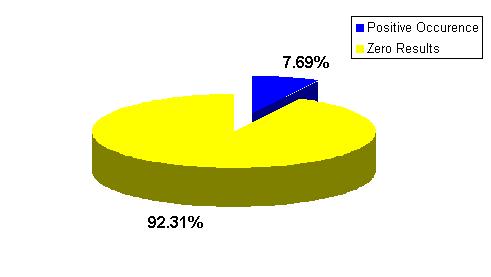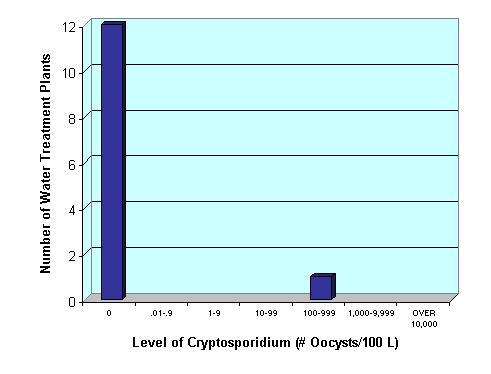 Levels of Source Water (Untreated) Cryptosporidium for GEORGIA
Levels of Source Water (Untreated) Cryptosporidium for GEORGIA
SEPTEMBER 1997
| REMINDER: Data Purpose: The ICR data were collected as part of a national research project to support development
of national drinking water standards. They should NOT be used to determine local water systems compliance with drinking water standards, nor should they
be used to make personal judgements about health risks.
Detection Method Limitations: The ICR method for detecting Cryptosporidium and Giardia has technical limitations. Results of Zero: A measurement of zero means that no Cryptosporidium was found in the sample volume that was analyzed. Zero results do not indicate the absence of Cryptosporidium in the source water because the method recovery is low and the amount of sample analyzed is small. In other words, Cryptosporidium may be present in source water even if no oocysts are counted for the sample volume analyzed. The presence of Cryptosporidium may also be mistakenly identified as other organic material such as algae. Efforts Beyond Regulations: Many large public water systems are voluntarily improving the control of pathogens by participating in the Partnership for Safe Water, an initiative between EPA, the States, and water suppliers to improve the performance of treatment. |

Percent Treatment Plants Reporting a Positive Occurrence of Source Water Cryptosporidium in GEORGIA

GEORGIA Levels of Cryptosporidium in Source Water for SEPTEMBER 1997

GEORGIA Levels of Cryptosporidium in Source Water for SEPTEMBER 1997
| Level of Total Cryptosporidium (#oocysts/100L) | Number of Water Treatment Plants |
|---|---|
| 0 | 12 |
| 100-999 | 1 |
View national data for the same month.
 ICR Overview
ICR Overview
 Envirofacts Home Page
Envirofacts Home Page
![[logo] US EPA](../gif/logo_epaseal.gif)